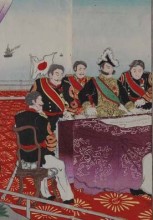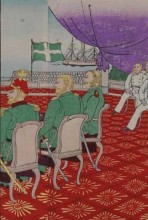This Day in World History
February 8, 1904
Japanese Attack Port Arthur, Starting Russo-Japanese War
 On February 8, 1904, just before midnight, Japanese destroyers entered the harbor of Port Arthur (now Lü-shun, China). Soon after, they unleashed torpedoes against Russian ships in a surprise attack that began the Russo-Japanese War.
On February 8, 1904, just before midnight, Japanese destroyers entered the harbor of Port Arthur (now Lü-shun, China). Soon after, they unleashed torpedoes against Russian ships in a surprise attack that began the Russo-Japanese War.
The conflict grew over competition between Russia and Japan for territory in both Korea and Manchuria, in northern China. Japan had won Port Arthur, at the tip of the Liaotung Peninsula, from China in an 1894–1895 war. Russia joined with other European powers to force it to relinquish the port, however — and then three years later had compelled China to grant the city to it. These actions rankled Japan, as did Russia’s refusal to honor a promise to withdraw troops from Manchuria. Japan decided to go to war.
The attack on Port Arthur resumed in the late morning of February 9, when bigger Japanese ships began shelling the Russian fleet and nearby forts. The Russians put up more resistance than expected, however, and the Japanese ships withdrew.
 The attack on Port Arthur was inconclusive, but the rest of the war went largely Japan’s way. The Japanese enjoyed several victories in 1904, seizing Korea in March, and defeating Russian forces twice in Manchuria during the summer. More success followed in 1905, with the surrender of Port Arthur in January, a victory over a large Russian army in Manchuria in March, and a decisive naval battle at Tsushima Strait in May that destroyed the Russian fleet. Russia’s government, facing unrest at home, was forced to seek peace.
The attack on Port Arthur was inconclusive, but the rest of the war went largely Japan’s way. The Japanese enjoyed several victories in 1904, seizing Korea in March, and defeating Russian forces twice in Manchuria during the summer. More success followed in 1905, with the surrender of Port Arthur in January, a victory over a large Russian army in Manchuria in March, and a decisive naval battle at Tsushima Strait in May that destroyed the Russian fleet. Russia’s government, facing unrest at home, was forced to seek peace.
The Russo-Japanese War marked the first victory of a non-European nation against a European one in modern times. It also contributed to unrest in Russia that would lead, more than a decade later, to the Russian Revolution.
“This Day in World History” is brought to you by USA Higher Education.
You can subscribe to these posts via RSS or receive them by email.


Sarah Russo, Associate Director, Publicity, [email protected], http://twitter.com/sarahrusso
Years ago, I started my career in publicity as an assistant at Alfred A. Knopf. It was the ultimate place to learn about books, authors, the publishing industry, the “right” way to do things in the publicity world, the civilized way.
Every day started for me at 7:30am, cup of coffee in hand, the other assistant and I divided the morning papers and got to reading: The New York Times, Washington Post, Daily News, New York Post, Christian Science Monitor, Wall Street Journal, and several other big dailies. We read them all, devoured them is more like it, searching for mentions of Knopf books—clipping, pasting, photocopying; putting together the “clips packet,” arts & crafts for the publicity set—to circulate to sales, marketing, editorial, and the rest of the publicity department. Yes, there were that many mentions of Knopf books each day. The packet was huge, thirty, forty pages on most days, far more on Mondays when we received the Sunday papers from around the country.
The office was a rotating cast of celebrity authors and poets. Michael Crichton, V.S. Naipaul, Toni Morrison, Eli Wiesel, and celebrity editors: Ash Green, Gary Fisketjon, Deb Garrison, Judith Jones. If you don’t know Judith Jones’s name it’s only because she is the personification of a true editor: the person behind the scenes, never flashy, never usurping the true performers—the writers—she just made the books better. But you do know her work. She discovered Julia Child, and there is a story that’s told at Knopf that she is the person who discovered The Diary of Anne Frank in the slush pile as an assistant at HarperCollins Paris. She was, of course, John Updike’s editor. And their friendship was palpable.
One afternoon, I had the chance to spend the day in Judith’s office, overlooking the East River (as Knopf was then at 201 East 50th Street) with John Updike. As a publicity assistant part of my job was to help authors sign their books when they came in to the office. When they are being asked to sign 300 copies for the sales force having someone un-boxing books, opening them to the title page and packing them back up is a necessity. My job for the afternoon was to help and make polite conversation.
Learning to talk to famous people as a terribly shy, 22 year old was a painful process for me but Mr. Updike was a kind, generous person and full of conversation. And we had one thing in common: we’re both Dutch (or I am at least partly so). So we had the Netherlands to chat about. And as we were talking about Holland, Sijthoffs and Updikes, plugging through 300 copies of Gertrude & Claudius, a rainbow appeared over the East River. Truly, a rainbow. Utterly bucolic over the dingy buildings on the waterfront of Queens. And we just stood there, staring out the window, silent, surprised and smiling.
John Updike was a good man: an incredible writer, kind to the least important of publicity personnel, and a lover of words and the world. He will be missed.
 On February 8, 1904, just before midnight, Japanese destroyers entered the harbor of Port Arthur (now Lü-shun, China). Soon after, they unleashed torpedoes against Russian ships in a surprise attack that began the Russo-Japanese War.
On February 8, 1904, just before midnight, Japanese destroyers entered the harbor of Port Arthur (now Lü-shun, China). Soon after, they unleashed torpedoes against Russian ships in a surprise attack that began the Russo-Japanese War.  The attack on Port Arthur was inconclusive, but the rest of the war went largely Japan’s way. The Japanese enjoyed several victories in 1904, seizing Korea in March, and defeating Russian forces twice in Manchuria during the summer. More success followed in 1905, with the surrender of Port Arthur in January, a victory over a large Russian army in Manchuria in March, and a decisive naval battle at Tsushima Strait in May that destroyed the Russian fleet. Russia’s government, facing unrest at home, was forced to seek peace.
The attack on Port Arthur was inconclusive, but the rest of the war went largely Japan’s way. The Japanese enjoyed several victories in 1904, seizing Korea in March, and defeating Russian forces twice in Manchuria during the summer. More success followed in 1905, with the surrender of Port Arthur in January, a victory over a large Russian army in Manchuria in March, and a decisive naval battle at Tsushima Strait in May that destroyed the Russian fleet. Russia’s government, facing unrest at home, was forced to seek peace. 



What a beautiful memory!
[...] John Updike (1932-2009): A Publicist Remembers (oup.com) AdaptiveBlue [...]
I’m continually impressed and constantly surprised by you.
John Updike é o Balzac da classe média americana
http://www.revistabula.com/
http://www.revistabula.com/materia/john-updike-e-o-balzac-da-classe-media-americana-/950
To Carole:
Thanks Mom!